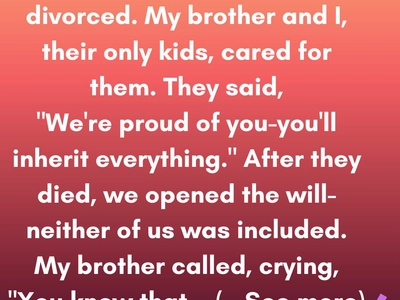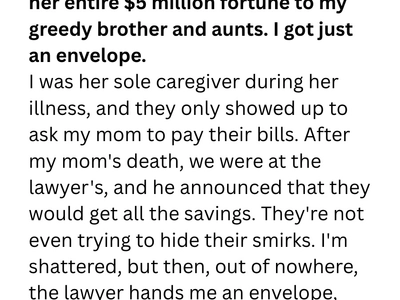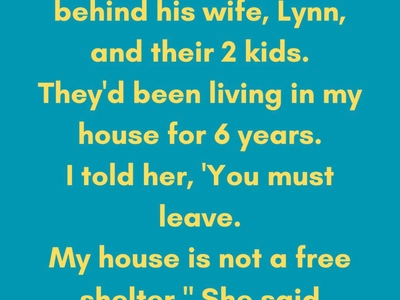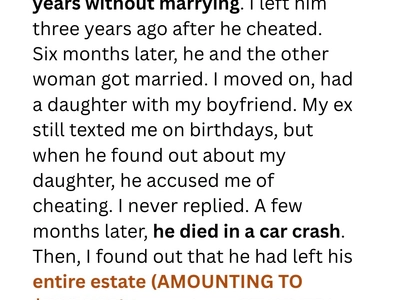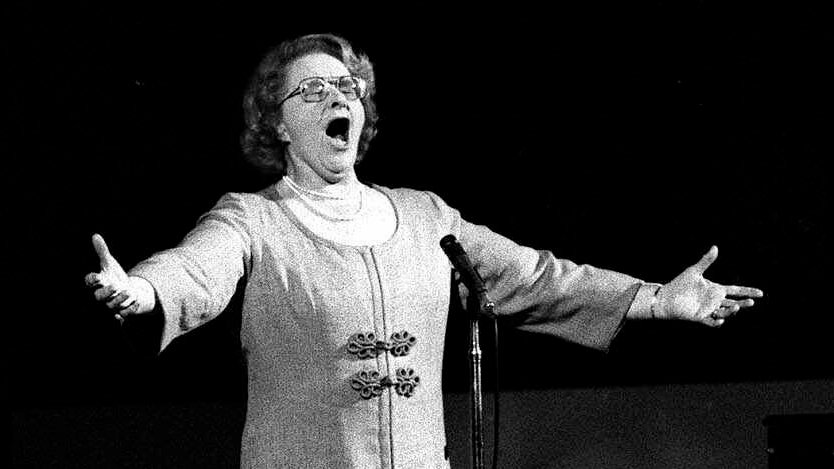The Letter My Parents Left Behind Taught Me the Real Meaning of Inheritance
My parents were never divorced. They spent their entire lives together, the kind of couple that finished each other’s sentences and laughed at jokes no one else understood. My brother and I grew up watching their quiet companionship — the shared coffee every morning, the way they held hands during evening walks, the small arguments that always ended in a smile. They weren’t perfect, but they were constant. They were home.
We were their only children, and from as far back as I can remember, we took care of them as best we could. When they got older, it felt natural to step in — not out of duty, but out of love. My brother handled most of the practical stuff, like fixing things around the house and managing their accounts. I took care of the emotional things — the phone calls, the visits, the reminders to take their medicine. Every Sunday, without fail, we went to see them. They’d cook lunch, we’d talk about the week, and for a few hours, everything in the world felt exactly as it should be.
They used to tell us how proud they were. “You boys make us so happy,” my mother would say, her eyes soft with pride. My father would nod and add, “You’ll inherit everything one day, you know.” It was never about greed or expectation — it was just one of those things parents say to remind you that you belong, that the family legacy will continue through you. We didn’t think much of it. We didn’t need to.
When they passed away, only a few months apart, it felt like a part of our world had gone silent. The house still smelled like them — a mix of old wood, lavender, and coffee. We stayed there for days, cleaning up, sorting through things, talking about them. Every corner of the house had a memory. The clock on the wall still ticked like it always did, almost stubbornly, as if refusing to accept they were gone.
Then came the day we opened the will. I remember sitting at the lawyer’s office, my brother beside me, both of us tense but calm. We expected the formalities — signatures, documents, maybe a few tears. Instead, we sat frozen as the lawyer read the words that changed everything. The entire estate — the house, the savings, even the small pieces of jewelry our mother had treasured — had been left to a charity. Not a cent to either of us.
I looked at my brother in disbelief, waiting for him to laugh and say it was a mistake. But his face turned pale, his hands trembling. “You knew that…” he whispered into the phone later that night, voice cracking. I didn’t even understand what he meant.
“Knew what?” I asked, though I already sensed something underneath his words — something he wasn’t ready to say.
The days that followed were heavy. I couldn’t stop thinking about it. How could they have done that? We had been there, always. We’d never asked for anything, never argued, never given them reason to doubt our love. I went over every moment in my head — every visit, every phone call, every smile. Had we missed something? Had we disappointed them somehow?
It didn’t make sense. My brother and I had done everything right. We had made sure they were comfortable, renovated their old house so they could live safely in it. We’d paid for repairs, installed a new heater, repainted the walls. They’d been so happy when they saw it — my mother even cried. “You’ve given us the best gift,” she said that day. “Now we can stay here till the end.”
And they did.
But now, standing in that same house, it felt different. The warmth was gone, replaced by confusion and a quiet ache. My brother tried to move on quickly, saying it didn’t matter. “They’re gone. The money doesn’t change anything,” he said. But I could tell it haunted him too.
I started searching for answers. Maybe it was grief, or maybe I just needed closure. I went through their letters, old photographs, notes scribbled on the backs of grocery lists — anything that might explain why. Sometimes I stayed up all night, surrounded by piles of paper, hoping something would make sense.
Weeks passed. My brother stopped answering my calls for a while. He said he needed space. I didn’t blame him. We both dealt with loss differently — he turned quiet, I turned restless.
Then, one afternoon, I found something.
I had been sorting through my mother’s things in the kitchen — her old aprons, recipe cards, and a stack of yellowed cookbooks she’d collected over the years. She loved cooking, though half the time she forgot ingredients and laughed about it. As I flipped through one of her favorite books, a folded piece of paper slipped out and fell to the floor.
My heart raced. I picked it up and saw our names on it — written in her familiar, flowing handwriting. “To our sons,” it said.
I sat down before opening it. My hands shook as I unfolded the paper.
The note was short, just a few lines, but it hit harder than anything else could have:
“You already have what we wanted to give you. A bond stronger than money. The house, the savings — they can help others. But what you two have is what helped us most.”
I read it over and over, trying to take in every word. It was her voice, her heart, her truth — all in a few sentences. I felt something shift inside me, like a knot slowly loosening. For the first time since their passing, I felt their love again, not as a memory but as something alive.
When I showed the note to my brother, he didn’t speak for a long time. We sat at the kitchen table, the same one where we’d shared countless family meals, staring at the paper between us. The air felt heavy, yet calm.
Finally, he whispered, “They were right.”
It wasn’t about what we didn’t receive. It was about what we already had.
In that moment, I saw it clearly. Our parents hadn’t abandoned us or forgotten us. They had trusted us — trusted that we would understand someday. They knew money could build walls as easily as it could tear them down, but love — real love — built bridges that lasted.
We realized what they had left behind was far greater than any inheritance. They had given us patience — the kind that taught us to listen before speaking. They had given us kindness — the kind that made us show up for them, week after week, even when life got busy. And they had given us each other.
After that day, something changed between my brother and me. We talked more, laughed more. The bitterness faded, replaced by quiet gratitude. We started doing small things in their honor — donating to causes they cared about, cooking their favorite meals on Sundays, keeping their garden alive.
It wasn’t easy. There were still moments when I thought about the house and felt a pang of loss. But every time I walked past the park where they used to sit together, I could almost hear my father’s voice saying, “Take care of each other, boys.”
And we did.
As months turned into years, I came to understand their decision in ways I never could have before. Maybe they had seen what money does to families — how it turns love into rivalry, gratitude into greed. Maybe they wanted to make sure we never had to go through that. Maybe they believed that by giving away everything, they were freeing us from a future of resentment.
Whatever their reasons, I finally accepted them.
Sometimes I still visit the charity they donated to. The people there always speak warmly about my parents — about how their contribution helped build a new community center, how it supported families in need. Every time I walk through those halls, I see pieces of them everywhere — my father’s careful planning, my mother’s generous spirit. It feels like they’re still giving, still alive in the kindness they passed on.
One day, my brother and I went back to the old house before it was sold. It was empty except for a few boxes and the echo of our childhood. We sat on the living room floor, leaning against the walls we had painted together years before. Sunlight streamed through the windows, warm and gentle.
“Do you ever think they planned this all along?” my brother asked.
I smiled. “Of course they did. You know Mom — she always had a plan.”
He laughed softly, shaking his head. “Yeah. I guess she did.”
We sat there until the sun went down, talking about everything and nothing. For the first time since their passing, the silence didn’t hurt. It felt peaceful.
That night, I realized something else. The will, the note, the confusion — it had all been part of their final lesson. They had taught us that love isn’t proven by what you’re given, but by what you give away. That letting go, even when it hurts, can be an act of faith. And that true inheritance doesn’t come in the form of property or savings — it comes in the quiet ways you live, the small kindnesses that ripple through time.
Years later, when people asked me about my parents, I never mentioned the will. I told them about the way my father used to whistle while fixing things around the house, or how my mother danced while cooking. I told them how they made ordinary days feel special. That’s what I remembered — not the things they owned, but the way they lived.
My brother and I still keep that note. It’s framed now, hanging in my living room. Every time I see it, I’m reminded of how close we came to losing more than money — how easy it would have been to let resentment replace love. But their words saved us from that. They reminded us of who we were, and who we could still be.
Sometimes, when I’m alone, I think about the last line: “What you two have is what helped us most.” I used to wonder what they meant. Now I think I know. It wasn’t just about our love for them — it was about how we loved each other. Our bond had been their greatest comfort, their greatest pride.
And in the end, that was the inheritance they wanted to leave — not one that could be measured or divided, but one that could grow.
Love, after all, doesn’t fade when it’s shared. It multiplies. It fills the spaces that loss leaves behind. It turns what once felt like an ending into something that never truly ends.
That’s what they left us with. And that’s what we’ll carry — always.
